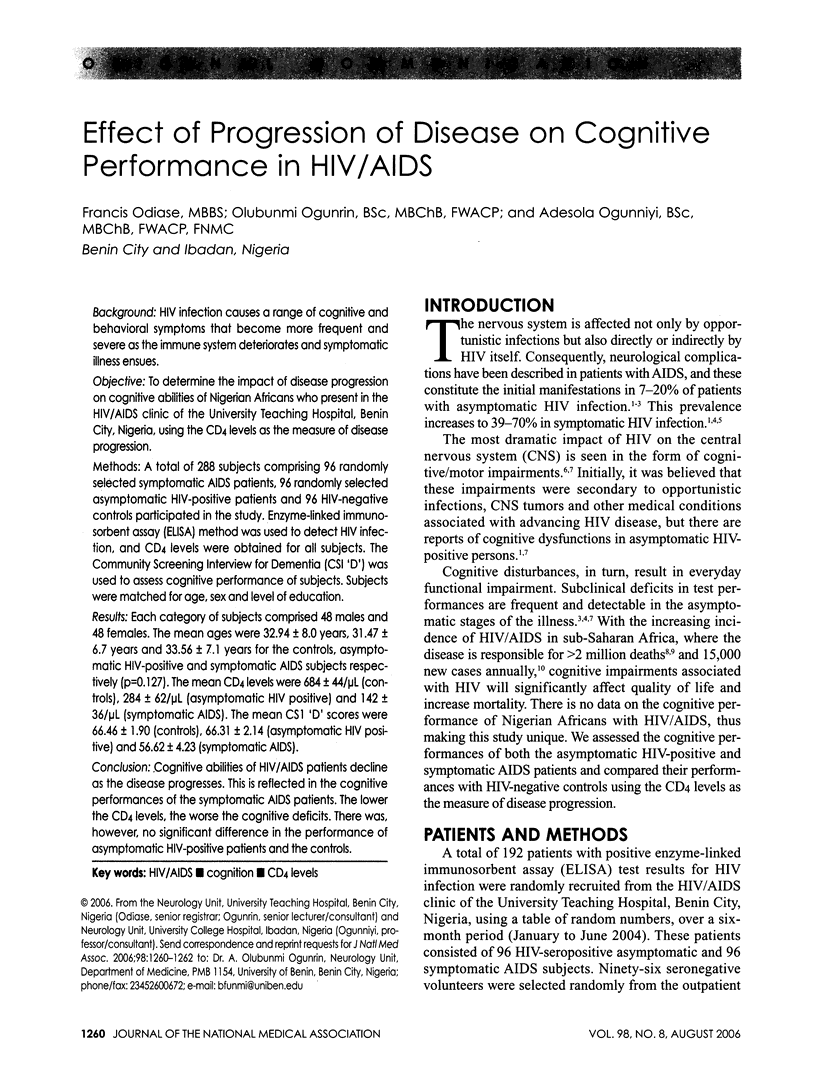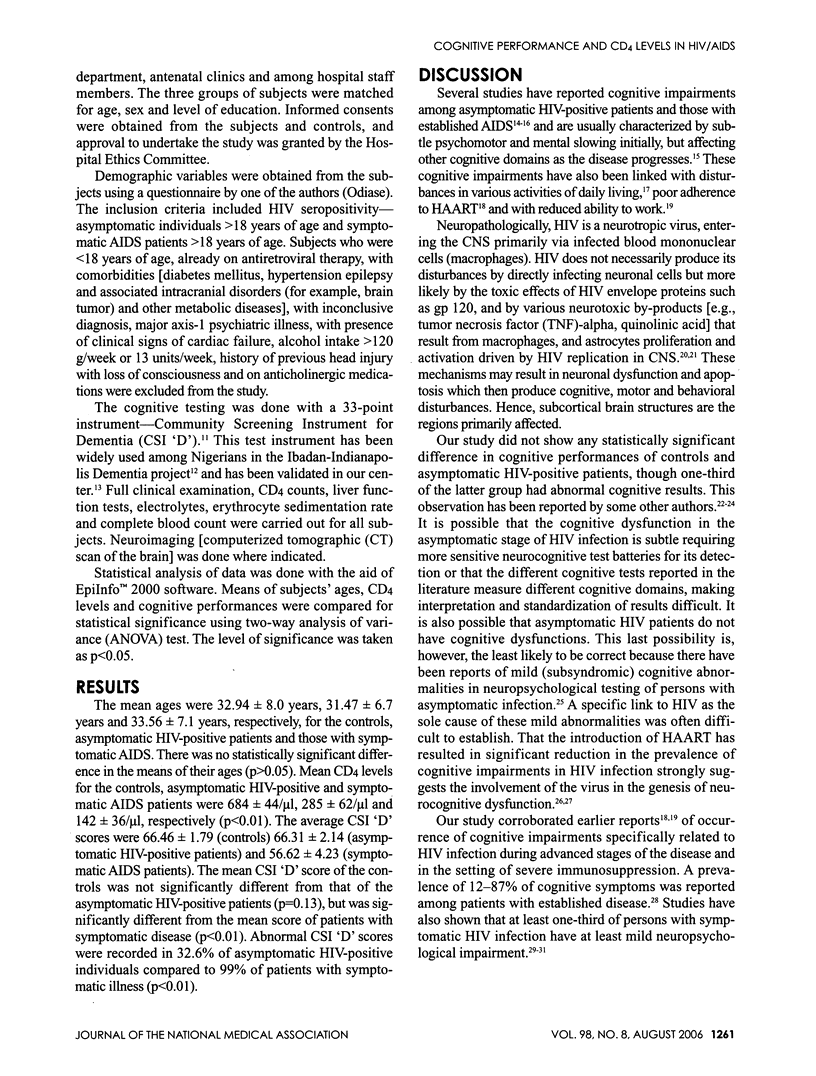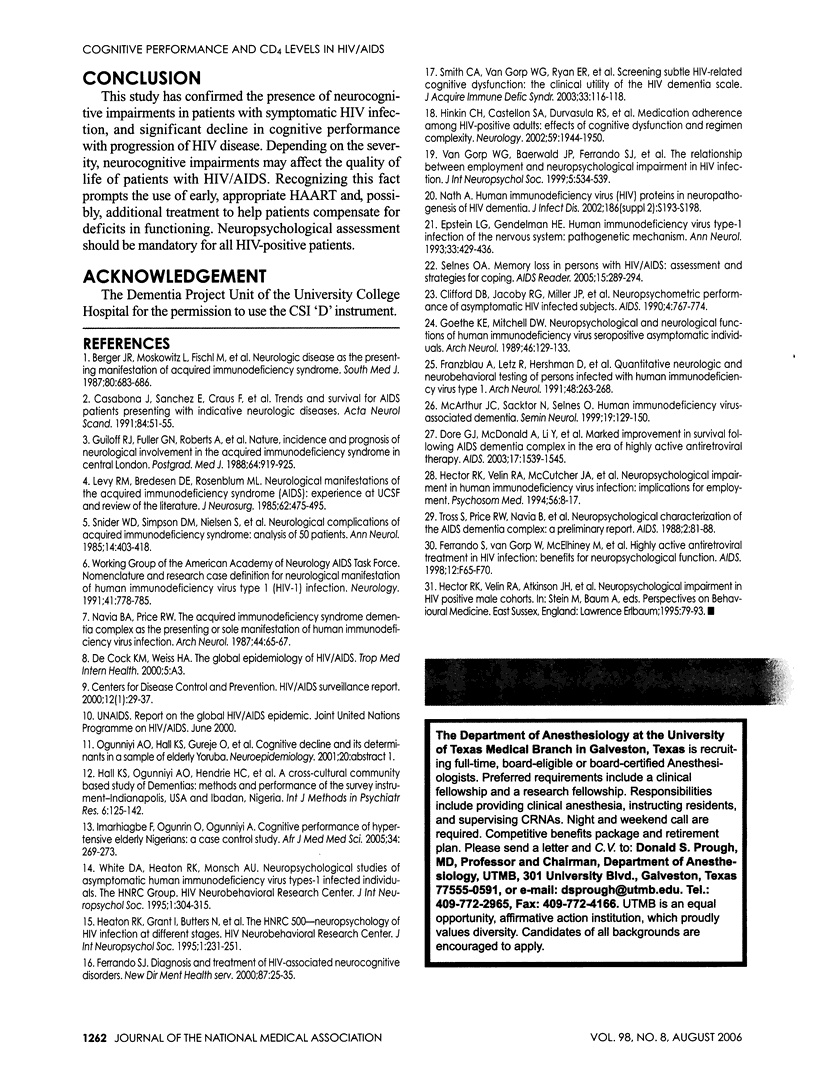Abstract
BACKGROUND: HIV infection causes a range of cognitive and behavioral symptoms that become more frequent and severe as the immune system deteriorates and symptomatic illness ensues. OBJECTIVE: To determine the impact of disease progression on cognitive abilities of Nigerian Africans who present in the HIV/AIDS clinic of the University Teaching Hospital, Benin City, Nigeria, using the CD4 levels as the measure of disease progression. METHODS: A total of 288 subjects comprising 96 randomly selected symptomatic AIDS patients, 96 randomly selected asymptomatic HIV-positive patients and 96 HIV-negative controls participated in the study. Enzyme-linked immunosorbent assay (ELISA) method was used to detect HIV infection, and CD4 levels were obtained for all subjects. The Community Screening Interview for Dementia (CSI 'D') was used to assess cognitive performance of subjects. Subjects were matched for age, sex and level of education. RESULTS: Each category of subjects comprised 48 males and 48 females. The mean ages were 32.94 +/- 8.0 years, 31.47 +/- 6.7 years and 33.56 +/- 7.1 years for the controls, asymptomoatic HIV-positive and symptomatic AIDS subjects respectively (p = 0.127). The mean CD4 levels were 684 +/- 44/microL (controls), 284 +/- 62/microL (asymptomatic HIV positive) and 142 +/- 36/microL (symptomatic AIDS). The mean CS1 'D' scores were 66.46 +/- 1.90 (controls), 66.31 +/- 2.14 (asymptomatic HIV positive) and 56.62 +/- 4.23 (symptomatic AIDS). CONCLUSION: Cognitive abilities of HIV/AIDS patients decline as the disease progresses. This is reflected in the cognitive performances of the symptomatic AIDS patients. The lower the CD4 levels, the worse the cognitive deficits. There was, however, no significant difference in the performance of asymptomatic HIV-positive patients and the controls.
Full text
PDF


Selected References
These references are in PubMed. This may not be the complete list of references from this article.
- Berger J. R., Moskowitz L., Fischl M., Kelley R. E. Neurologic disease as the presenting manifestation of acquired immunodeficiency syndrome. South Med J. 1987 Jun;80(6):683–686. doi: 10.1097/00007611-198706000-00004. [DOI] [PubMed] [Google Scholar]
- Casabona J., Sánchez E., Graus F., Abós J., Segura A. Trends and survival for AIDS patients presenting with indicative neurologic diseases. Acta Neurol Scand. 1991 Jul;84(1):51–55. doi: 10.1111/j.1600-0404.1991.tb04902.x. [DOI] [PubMed] [Google Scholar]
- Clifford D. B., Jacoby R. G., Miller J. P., Seyfried W. R., Glicksman M. Neuropsychometric performance of asymptomatic HIV-infected subjects. AIDS. 1990 Aug;4(8):767–774. doi: 10.1097/00002030-199008000-00008. [DOI] [PubMed] [Google Scholar]
- Cock K. M., Weiss H. A. The global epidemiology of HIV/AIDS. Trop Med Int Health. 2000 Jul;5(7):A3–A9. doi: 10.1046/j.1365-3156.2000.00590.x. [DOI] [PubMed] [Google Scholar]
- Dore Gregory J., McDonald Ann, Li Yueming, Kaldor John M., Brew Bruce J., National HIV Surveillance Committee Marked improvement in survival following AIDS dementia complex in the era of highly active antiretroviral therapy. AIDS. 2003 Jul 4;17(10):1539–1545. doi: 10.1097/00002030-200307040-00015. [DOI] [PubMed] [Google Scholar]
- Epstein L. G., Gendelman H. E. Human immunodeficiency virus type 1 infection of the nervous system: pathogenetic mechanisms. Ann Neurol. 1993 May;33(5):429–436. doi: 10.1002/ana.410330502. [DOI] [PubMed] [Google Scholar]
- Ferrando S. J. Diagnosis and treatment of HIV-associated neurocognitive disorders. New Dir Ment Health Serv. 2000 Fall;(87):25–35. doi: 10.1002/yd.23320008705. [DOI] [PubMed] [Google Scholar]
- Ferrando S., van Gorp W., McElhiney M., Goggin K., Sewell M., Rabkin J. Highly active antiretroviral treatment in HIV infection: benefits for neuropsychological function. AIDS. 1998 May 28;12(8):F65–F70. doi: 10.1097/00002030-199808000-00002. [DOI] [PubMed] [Google Scholar]
- Franzblau A., Letz R., Hershman D., Mason P., Wallace J. I., Bekesi J. G. Quantitative neurologic and neurobehavioral testing of persons infected with human immunodeficiency virus type 1. Arch Neurol. 1991 Mar;48(3):263–268. doi: 10.1001/archneur.1991.00530150031013. [DOI] [PubMed] [Google Scholar]
- Goethe K. E., Mitchell J. E., Marshall D. W., Brey R. L., Cahill W. T., Leger G. D., Hoy L. J., Boswell R. N. Neuropsychological and neurological function of human immunodeficiency virus seropositive asymptomatic individuals. Arch Neurol. 1989 Feb;46(2):129–133. doi: 10.1001/archneur.1989.00520380029008. [DOI] [PubMed] [Google Scholar]
- Guiloff R. J., Fuller G. N., Roberts A., Hargreaves M., Gazzard B., Scaravilli F., Harcourt-Webster J. N. Nature, incidence and prognosis of neurological involvement in the acquired immunodeficiency syndrome in central London. Postgrad Med J. 1988 Dec;64(758):919–925. doi: 10.1136/pgmj.64.758.919. [DOI] [PMC free article] [PubMed] [Google Scholar]
- Heaton R. K., Grant I., Butters N., White D. A., Kirson D., Atkinson J. H., McCutchan J. A., Taylor M. J., Kelly M. D., Ellis R. J. The HNRC 500--neuropsychology of HIV infection at different disease stages. HIV Neurobehavioral Research Center. J Int Neuropsychol Soc. 1995 May;1(3):231–251. doi: 10.1017/s1355617700000230. [DOI] [PubMed] [Google Scholar]
- Heaton R. K., Velin R. A., McCutchan J. A., Gulevich S. J., Atkinson J. H., Wallace M. R., Godfrey H. P., Kirson D. A., Grant I. Neuropsychological impairment in human immunodeficiency virus-infection: implications for employment. HNRC Group. HIV Neurobehavioral Research Center. Psychosom Med. 1994 Jan-Feb;56(1):8–17. doi: 10.1097/00006842-199401000-00001. [DOI] [PubMed] [Google Scholar]
- Hinkin C. H., Castellon S. A., Durvasula R. S., Hardy D. J., Lam M. N., Mason K. I., Thrasher D., Goetz M. B., Stefaniak M. Medication adherence among HIV+ adults: effects of cognitive dysfunction and regimen complexity. Neurology. 2002 Dec 24;59(12):1944–1950. doi: 10.1212/01.wnl.0000038347.48137.67. [DOI] [PMC free article] [PubMed] [Google Scholar]
- Imarhiagbe F., Ogunrin O., Ogunniyi A. Cognitive performance of hypertensive elderly Nigerians: a case control study. Afr J Med Med Sci. 2005 Sep;34(3):269–273. [PubMed] [Google Scholar]
- Levy R. M., Bredesen D. E., Rosenblum M. L. Neurological manifestations of the acquired immunodeficiency syndrome (AIDS): experience at UCSF and review of the literature. J Neurosurg. 1985 Apr;62(4):475–495. doi: 10.3171/jns.1985.62.4.0475. [DOI] [PubMed] [Google Scholar]
- McArthur J. C., Sacktor N., Selnes O. Human immunodeficiency virus-associated dementia. Semin Neurol. 1999;19(2):129–150. doi: 10.1055/s-2008-1040831. [DOI] [PubMed] [Google Scholar]
- Nath Avi. Human immunodeficiency virus (HIV) proteins in neuropathogenesis of HIV dementia. J Infect Dis. 2002 Dec 1;186 (Suppl 2):S193–S198. doi: 10.1086/344528. [DOI] [PubMed] [Google Scholar]
- Navia B. A., Price R. W. The acquired immunodeficiency syndrome dementia complex as the presenting or sole manifestation of human immunodeficiency virus infection. Arch Neurol. 1987 Jan;44(1):65–69. doi: 10.1001/archneur.1987.00520130051017. [DOI] [PubMed] [Google Scholar]
- Selnes Ola A. Memory loss in persons with HIV/AIDS: assessment and strategies for coping. AIDS Read. 2005 Jun;15(6):289-92, 294. [PubMed] [Google Scholar]
- Smith Clifford A., van Gorp Wilfred G., Ryan Elizabeth R., Ferrando Stephen J., Rabkin Judith. Screening subtle HIV-related cognitive dysfunction: the clinical utility of the HIV dementia scale. J Acquir Immune Defic Syndr. 2003 May 1;33(1):116–118. doi: 10.1097/00126334-200305010-00018. [DOI] [PubMed] [Google Scholar]
- Tross S., Price R. W., Navia B., Thaler H. T., Gold J., Hirsch D. A., Sidtis J. J. Neuropsychological characterization of the AIDS dementia complex: a preliminary report. AIDS. 1988 Apr;2(2):81–88. doi: 10.1097/00002030-198804000-00002. [DOI] [PubMed] [Google Scholar]
- White D. A., Heaton R. K., Monsch A. U. Neuropsychological studies of asymptomatic human immunodeficiency virus-type-1 infected individuals. The HNRC Group. HIV Neurobehavioral Research Center. J Int Neuropsychol Soc. 1995 May;1(3):304–315. doi: 10.1017/s1355617700000308. [DOI] [PubMed] [Google Scholar]
- van Gorp W. G., Baerwald J. P., Ferrando S. J., McElhiney M. C., Rabkin J. G. The relationship between employment and neuropsychological impairment in HIV infection. J Int Neuropsychol Soc. 1999 Sep;5(6):534–539. doi: 10.1017/s1355617799566071. [DOI] [PubMed] [Google Scholar]


